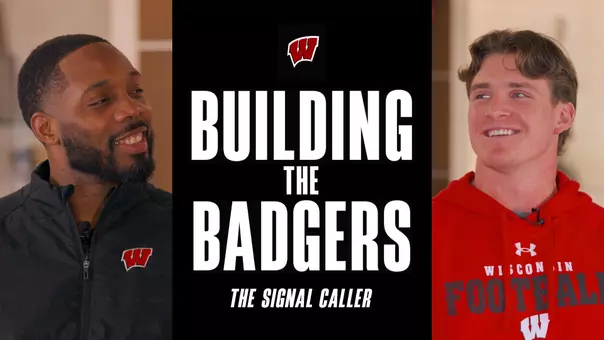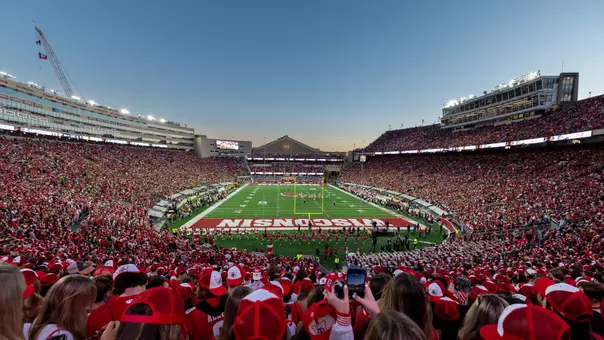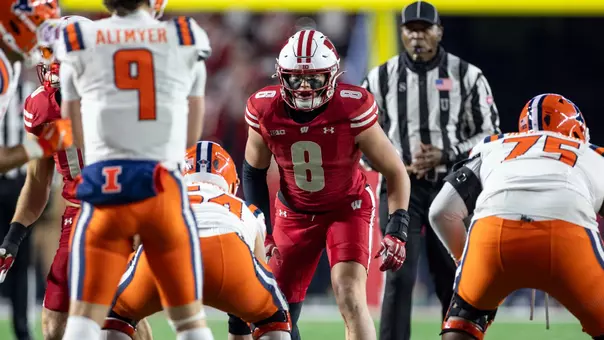Lucas at Large: Alvarez reflects on CFP committee run
December 14, 2016 | Football, Mike Lucas
Tenure now over, Badgers’ AD looks back on helping set the standard
 |
||
|
BY MIKE LUCAS
UWBadgers.com Senior Writer
MADISON, Wis. — Now that Barry Alvarez has fulfilled a three-year commitment to the College Football Playoff selection committee, a labor of love for the Wisconsin athletic director and Hall of Fame coach, he can look back with satisfaction on his personal involvement and what the process has meant to the sport.
"I feel like I gave something back to college football, which I wanted to do," said Alvarez. "Looking back on my term, I'm glad that I was on the first committee and kind of set the standard. I enjoyed the people who were involved and the people I got to meet and spend a lot of time with.
"But it was a grind, it was very difficult, it was time-consuming. During that stretch that you're there meeting (in Grapevine, Texas; 30 minutes outside of Dallas), you're giving up two days (Monday and Tuesday) in the office during the week and you have to get caught up when you get back.
"It was demanding, but I'm still glad that I did it."
Alvarez isn't the only voter concluding a committee term. So are Bobby Johnson, the former Vanderbilt coach, and Condoleezza Rice, the former Stanford provost and Secretary of State. Asked if he had any interest in extending his commitment, Alvarez said, "Three years was enough for me."
What kind of advice, in turn, would he give to the person replacing him?
"You'd better like football and you'd better be prepared to put some time into it, because it's work," said Alvarez, who will turn 70 at the end of the month. "So I'd tell them to meet with somebody from the committee that can teach them how you prep for meetings and how you evaluate teams.
"You have to decide what is important to you (regarding the criteria) and have it all laid out when you show up for the meetings so you can discuss it. Sometimes it takes a few meetings to understand that. I'd also recommend they feel free to express their opinion.
"That's what I saw during the time that I was on the committee. Everyone respected everyone's opinion. You don't have to agree with everyone. But you do have to be able to express your own opinion. I thought the voter structure was really well thought out. The process is good."

Alvarez officially accepted an invitation to join the committee in June of 2013. Acknowledging the uniqueness of the assignment, he said then, "It's a change. We're breaking away from the tradition of the polls. We're breaking away from the tradition of the BCS where it was computers and polls."
Three years later, he can attest to how the committee has evolved.
"Being in there a few years allowed us to see some things," he said. "We saw some areas in our process that we cleaned up. We just fine-tuned some things. We were spending a lot of time on some areas. One year, it took us two hours to reset the Top 25 that we had already set the night before."
But that was also a part of the mechanism, the logistics, the protocol.
"We'd always sleep on it," Alvarez explained, "and come back and take another look."
The committee went about its deliberations in a meticulous fashion, Alvarez suggested. To which, he felt input from Mike Tranghese and Tom Jernstedt was invaluable to the growth of the football process because of their experience with the NCAA men's basketball selection committee.
"I'm sure there was a lot of carryover," Alvarez said, "from one committee to the other."
One huddles for a long weekend in March. The other meets for six weeks in November and December. College Football Playoff executive director Bill Hancock has spelled out logistical differences based on his knowledge of the inner workings of both the basketball and football committees.
Hancock has experienced many "firsts" as the first full-time director of the NCAA Final Four and the first executive director of the Bowl Championship Series (BCS). The CFP completed his hat trick. But it has not made him immune from scrutiny or criticism. The same applies to the committee members.
Alvarez believes that it comes with the turf, it comes with making decisions. Decision-makers, on the whole, are cast in a brighter, more discerning light. And there are plenty of decisions that factor into selecting the four best teams in the country; four best, not four most deserving, that's the mandate.
In a revealing admission, Big Ten commissioner Jim Delany has changed his stance on the criteria for selection. "I argued for the four best conference champions," he said on the ESPN College GameDay set on Dec. 3. "That was not the decision. We lost that election. That election was four years ago.
"We have to understand that elections happen, certain ideas are adopted and we're at a different place now. It's the four best teams."
What was the most important element to Alvarez?
"Strength of schedule and who you beat," he said. "I would weigh that more than anything else. Who did you beat, not who did you lose to. You may have a good loss. But it doesn't count. Head-to-head is important. But if one team has one loss, another has two, you can't disregard the other loss.
"Now, if you have two teams that are evenly matched and one is a conference champ and one is not, then you have to lean to the conference champ. That's one criteria that would separate teams.
"But if you think one team is better than another team and the other team is the conference champ, then you go with the better team."
As part of the process, painstaking as it may sound, Alvarez said, "Everyone would listen to both ends of the argument before voting on anything.
"As we discussed two teams, we've go over the pros and cons. Someone would build the case for and someone else would build the case against. And we could flip it and talk about why a team shouldn't be there and why someone else should be. That's the way we went through it."
Alvarez had to recuse himself if Wisconsin was part of the discussion.
Whenever the committee's transparency is questioned, Alvarez wonders why these same questions weren't asked with more urgency during the BCS era of computer programmers and writers.
"You don't think there was some bias?" he posed rhetorically of the old system.
There's no denying ESPN's influence on the presentation and/or process, Alvarez agreed.
"They've turned it into a mystery," he said. "You have a camera come in every day to start the meetings and then we close the doors and it's like we're in there mixing up a magical potion. Everybody wants to know what's going on behind those closed doors."
Alvarez insisted that they already should know the answer. "Every year, they do a mock selection and invite the media to take part," he said. "They get a chance to see what we do and how we do it. They do this every year with different writers and broadcasters. There's no conspiracy."
Some outsiders would like to see the playoff expanded to six or eight teams.
"I happen to like four personally," Alvarez said. "The regular season is still very important."
As far as this season's final four — Alabama, Ohio State, Clemson and Washington — Alvarez opined, "These four teams stand out and they belong."
As a college player, Alvarez had select highlights, keepsake moments. Same as a college head coach. What was his highlight from three years on the selection committee?
"That first year," he said, "we made a very tough decision to put Ohio State into the field. As they went on to win the national championship, it was very fulfilling knowing that we got it right."
Alvarez, a member of the Rose Bowl Hall of Fame, will soon be inducted into the Orange Bowl Hall of Fame. He has played in the bowl as a Nebraska linebacker. And he has coached in the bowl as a Notre Dame assistant coach. The Dec. 30 Orange Bowl will feature Michigan and Florida State.
Meanwhile, the Badgers will make their debut in the Jan. 2 Cotton Bowl against Western Michigan. "I know some of our fans seem disappointed after the conference championship game," Alvarez said. "But this is a big-time bowl that we've qualified for.
"This is one of the New Year's Six, one of the six bowls that we assign as a committee. As a kid growing up, I remember watching four games on January 1. You had the Cotton Bowl, Sugar Bowl, Rose Bowl and Orange Bowl that night. The Cotton Bowl has great history and tradition."
To this thinking, as a former coach, the bowl season can spawn upsets.
"Historically, if you're not ready to play and the other guys are fired up, you've seen those upsets," he said. "I'm sure Paul (Chryst) and our staff will get that message across to our players. Once they start watching film of Western Michigan, they'll understand that this is a very good team."
Despite all the hype surrounding the College Football Playoff, often to the detriment of other matchups, Alvarez is still a strong proponent of the bowl system with one caveat.
"I'm not sure that we don't have too many bowls and we've diluted it," he said. "I've always felt a bowl game was a reward for a good season, but now you're taking a 6-6 team or a losing team."
Upon further review, he conceded, "Yet when we first turned the program around here in the early '90s, we'd have welcomed that opportunity with open arms."
The temptation now, maybe the fear, is taking a bowl appearance for granted. That would never enter Alvarez's mind, even though Wisconsin has the longest active bowl streak in the Big Ten — 15 consecutive seasons. Only Florida State, Virginia Tech, Georgia, Oklahoma and LSU have longer streaks.
Nobody, for that matter, is more transparent on bowls than Alvarez. In case you have forgotten, he will remind you, bowls and/or bowl wins are good for the soul. So was the role that he played the last three seasons on the selection committee.
"I was glad that I was part of the process," he said.













